| Srl | Item |
| 1 |
ID:
110537
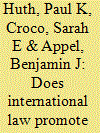

|
|
|
|
|
| Publication |
2011.
|
| Summary/Abstract |
In this article, we explain the role of international law in the resolution of territorial disputes from 1945 to 2000. In doing so, we focus on three outcomes of interest. First, when do states choose to revise the territorial status quo through negotiations instead of force? Second, when are states able to reach a final settlement? Third, when do states prefer a process of legal dispute resolution (i.e., adjudication or arbitration) to bilateral negotiations? To answer these questions, we argue that when the legal principles relevant to the dispute are unambiguous and clearly favor one side, a law-based focal point will emerge. This focal point, in turn, facilitates the settlement process by helping leaders overcome distribution problems, a central obstacle in reaching a final agreement. We find strong and consistent empirical support for our hypotheses regarding international law and peaceful dispute resolution.
|
|
|
|
|
|
|
|
|
|
|
|
|
|
|
|
| 2 |
ID:
118727
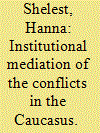

|
|
|
|
|
| Publication |
2012.
|
| Summary/Abstract |
The peaceful settlement of international conflicts has gained strong support and recognition as one of the fundamental principles of international relations. Different means and methods of mediation have been used by practitioners over the years. As a form of conflict management and peaceful settlement, mediation is very much in line with contemporary international relations. In the present-day interconnected multistate system, which includes a lot of broken agreements and unstructured conflicts, prevention or taking only one side may lead to a future struggle, or states may act only in their own interests and not always agree to enter negotiations. In such situations, mediation may be the only viable option the sides are willing to accept.
|
|
|
|
|
|
|
|
|
|
|
|
|
|
|
|
| 3 |
ID:
187324
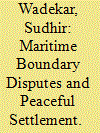

|
|
|
|
|
| Summary/Abstract |
United Nations Convention on the Law of the Sea (UNCLOS) is useful to settle the maritime boundary disputes between the parties. However, the LOS agreement did not settle the question of what states should do when maritime claims overlap because states are less than 400 nm apart or when two nations have adjacent economic zone. Art. 15 allow states to claim the median line as the maximum while states are negotiating. LOS does not provide a specific solution as to how divide overlapping maritime claims. States are competing for the utilization of the maritime resources. In the future, there is possibility of more maritime disputes among the states.
|
|
|
|
|
|
|
|
|
|
|
|
|
|
|
|
| 4 |
ID:
119631
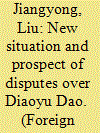

|
|
|
| 5 |
ID:
113998
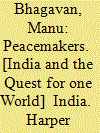

|
|
|
|
|
| Publication |
India, Harper Collins, 2012.
|
| Description |
xv, 237p.Hbk
|
| Standard Number |
9789350292273
|
|
|
|
|
|
|
|
|
|
|
|
Copies: C:1/I:0,R:0,Q:0
Circulation
| Accession# | Call# | Current Location | Status | Policy | Location |
| 056685 | 341.520954/BHA 056685 | Main | On Shelf | General | |
|
|
|
|
| 6 |
ID:
145370
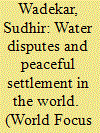

|
|
|
|
|
| Summary/Abstract |
Water is useful in various uses. Today its availability is core issue. World is struggling to cope with water scarcity. Water security has vital place in the governments’ agenda. Global climatic change will affect water availability. It is predicted that by the year 2025 a full 35 per cent of the world population will be living under conditions of water scarcity or stress. Formerly internal rivers have now become international water. Since the Second World War, the total number of the world’s independent nations has doubled. Decolonization is the reason in the increase of number of International River. Non-navigational uses of waters get importance thannavigational uses.
|
|
|
|
|
|
|
|
|
|
|
|
|
|
|
|